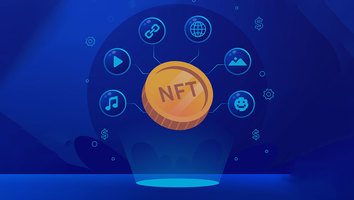When blockchain technology is revolutionizing so many industries then how can the healthcare sector be left behind? Well! This technology is helpful to fulfill the requirement of patients as well as healthcare professionals. Healthcare organizations are now using blockchain to ensure user security and ledger consistency.
Frost & Sullivan’s study predicts that from 2019-2025, the healthcare market will see growth at a CAGR of 63.85% while reaching a market value of $5.61 billion. PR Newswire also predicts that by 2028, the growth of blockchain in the healthcare sector shall reach around $7308.32 million with a CAGR of 76.30% between 2021-2028.
Healthcare being a complex industry is making the best use of blockchain technology to communicate between different parties like hospitals, doctors, insurance agencies, and other involved organizations for easy exchange of information.
A closer look at How Blockchain is transforming healthcare
Data security and monitoring are some benefits of this technology in the healthcare sector. Apart from this the other ways in which this technology is changing the healthcare sector include-
Electronic Health Records- EHR is one of the major applications of this technology that is helping to store patient medical history, medical data, prescriptions, and other reports. There is proper control over data transfer by this technology. Patients can keep control over their data and the data cannot be deleted/rectified. Sensitive data can easily be stored here, as blockchain in a database that cannot be deleted/rectified.
Continuous data monitoring- Healthcare is all about the patient’s life and therefore there is a need for 24*7 monitoring of the patient’s health. Electronic health records can be easily managed and optimized by this technology and this also avoids human errors that can cause big problems for patients. Blockchain is helpful in providing 24*7 data availability with better management of health records.
Supply Chain Management- Blockchain provides complete transparency at different stages right from production to delivery of medical drugs and this is an important factor. The pharmaceutical industry is a big chain, as a large number of parties are available and blockchain helps to control the entire supply chain. The complete supply chain including manufacturer-wholesaler-pharmacist-end user (patient) is recorded on this technology and can be easily tracked. This not only helps to reduce false cases but also maintains the quality.
Better data security- Data security is an important factor in every sector and blockchain ensures 100% data security in healthcare. This technology is constantly reducing fraud data cases, as data is not stored in the central server rather it is stored in a decentralized network. This strong decentralized network cannot be tampered with or accessed which in turn helps to maintain privacy.
Smart contracts- It is the smart contracts that ensure complete privacy of the data, as only authorized individuals can access private information. Smart contracts help to smoothen the different processes in this sector by managing the data and records of several patients.
Clinical trials- The concept of clinical trials and reports is lengthy and there is a requirement for a transparent solution to look at the results while ensuring that the results are safe. There is a lot of data available in clinical trials which is difficult to manage. To avoid fraud, editing, or any kind of data tampering, blockchain technology is really helpful. This technology ensures the safety and integrity of data. The third party cannot access, alter or delete any data. The identity of doctors or patients can be recognized by blockchain and this helps in authentic access to confidential data of clinical trials. It is worth mentioning that as per a report, the global clinical trials market in the year 2021 was valued at USD 38.7 billion. By the year 2026, the market is predicted to grow to 52.0 billion with a CAGR of 6.1%. Market growth is dependent on outsourced R&D, clinical trials, and other factors.
Medical billing and claims- Medical billing and claim is a long process and there can be fraud as well. Blockchain technology is used to overcome this problem, as it can alone handle the billing and claim process. The role of a middle person is eliminated, as the complete process is automated. This technology makes the claim process completely transparent while keeping data safe and avoiding fraud cases.
Safe drugs- The healthcare industry is all about drugs and their reactions to the human body. Negative reactions to a drug can cause serious problems for humans. To check the origin and history of a drug, blockchain technology is really helpful. This technology can look for fake or poor-quality drugs across the supply chain which in turn stops the severe actions.
Obstacles faced by Blockchain technology in healthcare
Although there are so many benefits of this technology in the healthcare sector it is still facing some challenges like-
Size of data- The data available in the medical field by healthcare stakeholders is immense on the other hand data that can be stored on a blockchain architecture depends on the block size which is limited. There is a requirement for a well-planned and executed architecture after closely monitoring the on-off chain data. Healthcare can use this technology wisely and effectively to store data safely.
Data privacy and HIPAA- HIPAA is associated with US healthcare law imposing strict rules to use and share patient data. Blockchain is helping the health sector comply with HIPAA along with other private data regulations but it is not very clear how the technology can be used to comply with other regulations.
Fixed data- Once information is uploaded it becomes difficult to execute changes in the blockchain technology. Just like two sides of a coin, this feature is both good and bad. At one time it maintains tight security while on the other hand, it restricts scalability. There is a requirement for extension in the current architecture to make the technology more suitable for the health industry.
Effective Role of Blockchain in the healthcare industry
All kinds of healthcare organizations whether large/small scale and new startups are using blockchain technology. Some of the real applications of blockchain technology in the health sector include-
Tracking a drug-Blockchain along with AI and IoT technology can help in the real-time tracking of drugs. Drugs can be easily traced in a supply chain right from the manufacture-patient. The problem of drug shortage can easily be figured out via means of this technology.
Verifying medical staff documents- So many medical professionals are working that it becomes difficult to verify their documents manually. Blockchain can quickly and easily assure authenticity of the professionals by verifying their documents.
Electronic health records- Blockchain technology supports a decentralized and safe platform to store electronic health records. It is important to save patients' records in such a way that only authorized people can access them.
Managing supply chain- Blockchain is helping to maintain a good supply chain of medical products/services. This helps to maintain medical standards while keeping track of medical supplies in real time.
Monitoring prescription drugs- Blockchain technology can keep track of prescription drugs in a secure way. This is helping people who use prescription drugs. Also, a record is maintained on the blockchain once a prescription drug is given and this helps to identify cases where the drugs are misused.
Genomics breakthrough- Data sharing is an integral part of genomics and usually patients are not willing to share their genomic data. Blockchain technology comes here, as it is helping to provide a decentralized genomic data-sharing platform so that patients can share their data while having control over it. Also, research says that by 2027, the global blockchain in genomics market size shall reach USD 1258.3 million.
Blood plasma supply chain-Shortage of plasma can be a serious problem in the market and to smoothen the plasma supply chain it is the blockchain technology that is being used. A decentralized platform is available for stakeholders to share information while tracking plasma supply in real time. Patients find it easy to access lifesaving treatment in case of severe conditions.
IoT security-Internet of Things is helping to keep track of patients remotely in the healthcare sector. Wearable sensors and other devices of IoT can easily get data like body temperature, BP, heart rate, etc. This data can be accessed by healthcare professionals and the only concern is the safety of patient data. Blockchain is solving this problem by maintaining data privacy.
Future of Blockchain in the health sector
Blockchain technology is slowly and steadily bringing a change in the healthcare industry. Till now the technology has been successful in providing better services, healthcare development, and research while maintaining patient data privacy. In the near future, this technology will be further accepted by the medical board across the globe with certain guidelines. There can be a chance for business process integration and optimization for the industry as well as stakeholders that will push towards a different world.
Final Say!
Blockchain technology has tremendous potential to revolutionize the healthcare sector. From improving patient data management to streamlining supply chain processes, the benefits are numerous. As a blockchain development company, we are excited to be at the forefront of this transformation and look forward to further innovations in the field.



